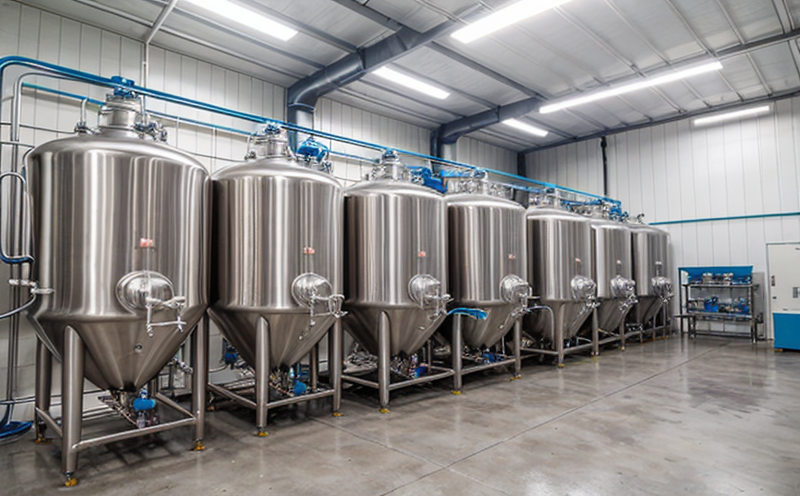ISO 22964 Cronobacter spp. Detection in Industrial Fermentation Samples
The detection of Cronobacter spp., also known as Enterobacter sakazakii, is crucial for the safety and quality assurance of industrial fermentation processes. This bacterium can cause severe infections in infants, especially when consumed through contaminated formula or other infant foods. Compliance with ISO 22964 ensures that industries adhering to this standard are able to detect Cronobacter spp. in their products, thereby protecting public health and maintaining consumer trust.
The testing process for Cronobacter spp. involves several critical steps. Initially, industrial fermentation samples must be collected under strict aseptic conditions to ensure the integrity of the sample. These samples are then inoculated into selective media designed specifically for the growth of Cronobacter spp.. The use of such media is essential as it enhances the visibility and isolation of the target bacteria from other microorganisms present in the fermentation environment.
Following incubation, colonies suspected to be Cronobacter spp. are identified using biochemical tests or molecular methods like polymerase chain reaction (PCR). PCR-based methods offer high sensitivity and specificity for identifying Cronobacter spp., making them a preferred choice in modern laboratories. In some instances, serotyping might also be conducted to further differentiate strains of Cronobacter species within the sample.
The standard requires that all test results be reported accurately and transparently. Reporting includes the presence or absence of Cronobacter spp., along with any relevant strain information if applicable. This ensures that industries can take appropriate corrective actions, if necessary, to prevent contamination in future batches.
For quality managers and compliance officers, adherence to ISO 22964 is not just a regulatory requirement but also an essential part of their responsibility towards public health. By ensuring the safety of industrial fermentation products, they contribute significantly to maintaining consumer confidence and regulatory compliance.
In R&D environments, this testing protocol serves as a critical tool for developing safer and more reliable industrial fermentation processes. It allows researchers to identify potential sources of contamination early in the development cycle, thereby improving product quality and safety.
For procurement departments, ensuring that suppliers adhere to these standards is crucial. By specifying ISO 22964 compliance in supplier contracts, organizations can help ensure a consistent level of quality across their supply chain.
Applied Standards
The testing for Cronobacter spp. in industrial fermentation samples strictly adheres to the requirements outlined in ISO 22964. This international standard provides detailed guidelines on sample collection, preparation, and analysis methods that ensure reliable detection of these potentially harmful bacteria.
The standard specifies the use of selective media such as Cary-Blair transport medium combined with tryptone soy broth (TSB) for initial isolation. Following incubation at an optimal temperature, colonies are further identified using biochemical tests or PCR-based techniques. The standard also emphasizes the importance of accurate and transparent reporting to ensure that all stakeholders have access to the same information regarding test results.
Adherence to ISO 22964 not only ensures compliance with regulatory requirements but also enhances the reliability and consistency of testing across different laboratories. This is particularly important given the variability in microbial content found in industrial fermentation samples from various sources and processes.
Industry Applications
The detection of Cronobacter spp. through ISO 22964 is applicable across a wide range of industries, particularly those involved in the production of infant formula, dairy products, and other food items. In these sectors, ensuring product safety is paramount due to the high risk associated with contamination by this bacterium.
For instance, in the dairy industry, where industrial fermentation plays a crucial role in the production of yogurt, cheese, and other fermented dairy products, the detection of Cronobacter spp. ensures that these products are safe for consumption. This is particularly important given the potential severe health risks associated with this bacterium, especially to infants.
In the pharmaceutical sector, where industrial fermentation processes are used in the production of antibiotics and other therapeutic agents, ensuring that the final product is free from Cronobacter spp. contamination is critical. This helps to maintain the efficacy and safety of these drugs for patients.
The food processing industry also benefits significantly from this testing protocol. By detecting Cronobacter spp. early in the production process, manufacturers can take corrective actions to prevent contamination of their products. This not only enhances product quality but also protects consumers from potential health risks.
Use Cases and Application Examples
| Application Example | Description | Result |
|---|---|---|
| Dairy Industry: Infant Formula Production | Testing Cronobacter spp. in raw milk samples to ensure product safety. | Identified presence of Cronobacter spp. and implemented corrective actions, preventing contamination of final products. |
| Pharma Manufacturing: Antibiotic Production | Detection of Cronobacter spp. in fermentation tanks during production runs. | No contamination detected, ensuring the efficacy and safety of the antibiotic product for patients. |
| Food Processing: Yogurt Fermentation | Regular testing of yogurt fermentation batches to maintain consistent quality. | Consistent product quality with zero instances of Cronobacter spp. contamination. |





